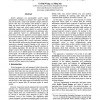Free Online Productivity Tools
i2Speak
i2Symbol
i2OCR
iTex2Img
iWeb2Print
iWeb2Shot
i2Type
iPdf2Split
iPdf2Merge
i2Bopomofo
i2Arabic
i2Style
i2Image
i2PDF
iLatex2Rtf
Sci2ools
117
click to vote
ICAC
2007
IEEE
2007
IEEE
Strider Search Ranger: Towards an Autonomic Anti-Spam Search Engine
Search spammers use questionable search engine optimization techniques to promote their spam links into top search results. Large-scale spammers target commerce queries that they can monetize and attempt to spam as many top search results of those queries as possible. We model the large-scale search spam problem as that of defending against correlated attacks on search rankings across multiple keywords, and propose an autonomic antispam approach based on self-monitoring and selfprotection. In this new approach, search engines monitor and correlate their own search results of spammer-targeted keywords to detect large-scale spam attacks that have successfully bypassed their current anti-spam solutions. They then initiate self-protection through targeted patrol of spam-heavy domains, targeted hunting at the sources of successful spam, and strengthening of specific weakness in the ranking algorithms. We describe the Strider Search Ranger system which implements this new approach, and focu...
| Added | 16 Aug 2010 |
| Updated | 16 Aug 2010 |
| Type | Conference |
| Year | 2007 |
| Where | ICAC |
| Authors | Yi-Min Wang, Ming Ma |
Comments (0)

